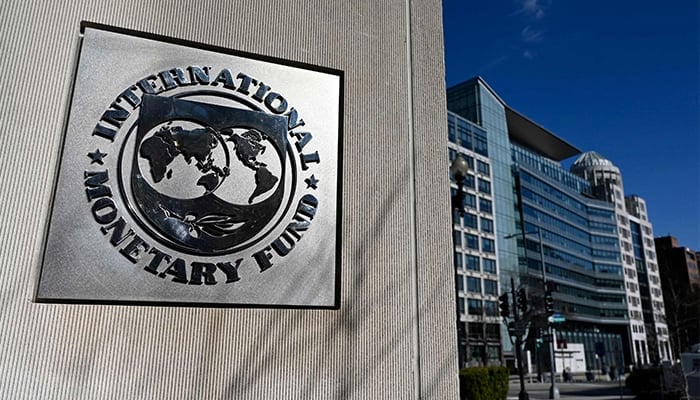By Ibe Wada,Meera Louis
Copyright bizwatchnigeria

The International Monetary Fund (IMF) has commended Nigeria for making significant progress in revenue mobilisation, improving transparency in foreign exchange (FX) management, and strengthening macroeconomic stability through sustained policy reforms.
Speaking during a press briefing on the Global Financial Stability Report at the ongoing IMF/World Bank Annual Meetings in Washington, D.C., the Fund’s officials said Nigeria’s economic trajectory is moving in a positive direction, citing improved policy coordination, fiscal discipline, and foreign reserve management as key stabilising factors.
The session featured Tobias Adrian, Financial Counsellor and Director of the IMF’s Monetary and Capital Markets Department (MCM); Vamvakidis Athanasios, Deputy Director; and Jason Wu, Assistant Director. It was moderated by Meera Louis, IMF Communications Officer.
Stronger Policy Reforms and FX Transparency
According to the IMF, Nigeria’s transition toward a more flexible exchange rate regime and its renewed emphasis on FX transparency have enhanced market confidence and improved external balance. The Fund described these measures as “vital reforms” that align with efforts to strengthen the country’s resilience against global economic shocks.
“Nigeria has taken important steps to improve revenue collection and transparency in foreign exchange and reserve management,” an IMF official said. “The direction of travel appears to be positive.”
The Fund also noted that tighter monetary policy under the Central Bank of Nigeria (CBN) has begun to yield results. Headline inflation, which peaked at over 30% in 2024, has declined to about 23% as of September 2025, aided by liquidity control measures, higher interest rates, and improved FX supply.
Foreign reserves have similarly strengthened, rising to approximately $42 billion, supported by higher oil receipts and improved non-oil export performance.
IMF officials emphasised that exchange rate adjustments should be viewed as a natural buffer rather than a negative signal.
“A depreciating currency is not necessarily harmful,” the Fund explained. “It allows economies to restore balance and competitiveness, especially when external conditions tighten.”
This position reflects the IMF’s ongoing endorsement of Nigeria’s FX unification and transparency efforts, which began in mid-2024 and are now showing early signs of stabilisation.
While acknowledging Nigeria’s progress, the IMF warned that Sub-Saharan Africa remains vulnerable to volatile capital inflows, debt pressures, and external shocks.
Although the region has maintained moderate growth amid improved global financial conditions, the Fund cautioned that abrupt reversals of foreign investments could expose structural weaknesses, particularly in economies reliant on external financing.
It urged African countries, including Nigeria, to consolidate recent gains through sound fiscal and monetary management, debt transparency, and structural reforms aimed at boosting domestic revenue.
In a related announcement, the IMF raised Nigeria’s economic growth forecast for 2025 to 3.9%, up from an earlier projection of 3.4%, citing improved macroeconomic conditions, rising investor confidence, and stronger oil production.
The Fund also revised Nigeria’s 2026 growth outlook upward to 4.2%, while increasing its 2024 growth estimate to 4.1%, following a rebasing of the nation’s Gross Domestic Product (GDP). The new GDP structure captures wider economic activities, particularly from the informal and digital sectors.
“Since July, Nigeria’s exchange rate has appreciated, financial conditions have strengthened, and investor sentiment has improved,” the Fund stated. “These factors, combined with higher oil output and improved security around key installations, underpin the stronger growth outlook.”
The IMF’s upward revision positions Nigeria as one of Sub-Saharan Africa’s top-performing large economies, alongside Ethiopia and Kenya. The Fund credited Nigeria’s recovery to its ongoing fiscal reforms, including the Tax and Fiscal Policy Committee’s drive to expand the tax base, reduce leakages, and enhance non-oil revenue.
Analysts, however, note that sustaining growth will depend on continued policy discipline, diversification of export earnings, and maintaining investor confidence through exchange rate stability.
Sub-Saharan Africa’s Broader Landscape
Across the region, the IMF projects growth to average 3.7% in 2025, buoyed by reforms in key economies. Nonetheless, the Fund warned that resource-dependent and conflict-affected nations remain at risk, while low-income economies are struggling with widening income gaps and debt service burdens.
To close the gap with advanced economies, the IMF urged African governments to strengthen institutions, modernise tax systems, and prioritise debt sustainability through improved fiscal discipline.
“The reform momentum in countries like Nigeria is a positive signal,” the IMF said, “but sustaining this progress will require consistent policy implementation and political will.”